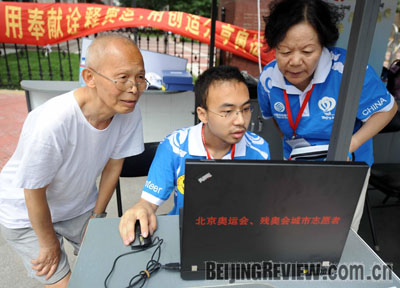|

BROADBAND MAGIC: Beijing is the first Olympics host city to provide free outdoor wireless
broadband Internet access to residents and visitors during the sports gala
The Summer Olympics gave the world myriad surprises with a dazzling opening ceremony, legendary sports record-breakers and smiling volunteers. Another surprise less known to the world was the fact that Beijing was the first Olympics host city to provide citizens and visitors with free Internet access in urban areas via a wireless network.
CECT-Chinacomm Communications Co. Ltd. (CECT-Chinacomm), a wireless broadband network builder and operator, created Beijing's WiCity project-free wireless Internet access within the city, which allows users with wireless capable devices such as laptops or PDAs to access the Internet free of charge.
"Beijing finished the network construction before the Olympics opened," said Xie Linzhen, chief scientist of CECT-Chinacomm, in an interview with Science Times, a publication of the Chinese Academy of Sciences. He said the Wi-Fi (wireless fidelity) signals cover a total area of 100 square km in the city proper, including the second and third ring roads, the central business district, Financial Street, the Zhongguancun technology hub in Haidian District, the Wangjing Economic and Technological Development Zone northeast of downtown, and the Yizhuang Industrial Park in southeast Beijing.
The WiCity project will be expanded in Beijing and set up in other cities nationwide over the next couple of years. CECT-Chinacomm will wrap up the third phase of Beijing's WiCity project by 2010, covering the entire city proper within the Fifth Ring Road, Xie said.
According to the government's plan, nine other cities-Shanghai, Guangzhou, Tianjin, Qingdao, Wuhan, Nanjing, Hangzhou, Shenzhen and Yangzhou-have already announced plans to establish their own city-wide Wi-Fi networks. Of these cities, Guangzhou and Shanghai, the hosts of the 16th Asian Games and the World Expo in 2010, started building networks in June. Hangzhou launched the trial operation of its WiCity project during the Beijing Olympics, with its wireless broadband network covering 80 percent of the city and mobile TV network covering the whole city proper.
Wireless convenience
After Philadelphia proposed the concept of a "wireless city" in July 2004, a wireless network construction craze swept the entire United States and spread to the rest of the world.
About 600 cities worldwide already have or will start wireless city projects, of which more than half are in the United States, Chen Derong, a professor at the Beijing University of Post and Telecommunications told Beijing Review. He predicts that the number of wireless cities worldwide would reach 1,500 by 2010.
| 